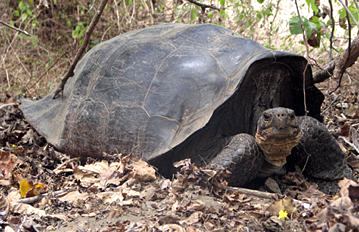 Researchers from Yale University say dozens of giant tortoises of a species believed extinct for 150 years may still be living at a remote location in the Galápagos Islands.
Researchers from Yale University say dozens of giant tortoises of a species believed extinct for 150 years may still be living at a remote location in the Galápagos Islands.
After conducting a genetic analysis of 1600 tortoises on Isabela Island, the scientists concluded that at least 38 purebred individuals of Chelonoidis elephantopus are still living 200 miles from their ancestral home of Floreana Island, where the species had disappeared after being hunted by whalers and workers at a heating oil factory that had been established on the island.
They confirmed that some of the Isabela Island tortoises, which have a lifespan that can exceed 100 years, were in fact direct descendants of the missing species from Floreana.
Analyzing the genetic signatures, they found 30 cases where breeding had taken place within the last 15 years. Since the lifespan of tortoises is so long, there is a high probability that many purebreds are still alive, note the researchers.
Intensive breeding of hybrids might allow scientists to resuscitate the C. elephantopus species even if sufficient numbers of purebred tortoises can not be found, Garrick said.
The team doubts that the tortoises reached the north shore of Isabela on their own and theorized the tortoises were transported as food from Floreana, but were either thrown overboard by whalers or discarded on land.
The research was published Jan. 9 in the journal Current Biology.



















